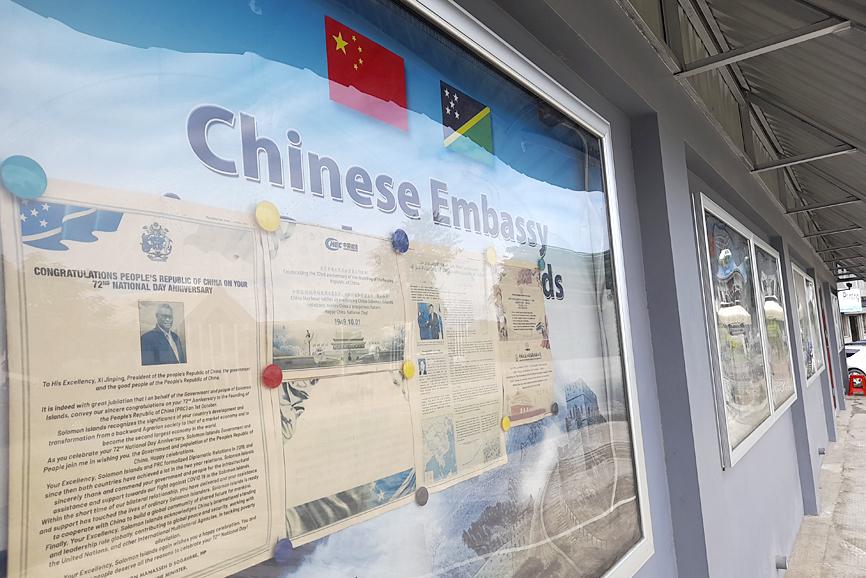The Solomon Islands said on Thursday that it had secured a US$66 million loan from China to fund tech giant Huawei Technologies Co’s (華為) plans to build 161 telecommunications towers across the Pacific nation.
The deal marks the first financing the country of islands has received from Beijing since it signed a secretive security pact in April following the severing of diplomatic links to Taiwan.
The Solomons’ government said the deal was a “historical financial partnership” that comes after it cut ties with Taiwan and restored ties with Beijing in 2019.

Photo: AP
However, the Solomons’ growing financial and security links to China have roused concern from the US and its allies. Western officials said that China could use the security pact to build a military base in the country — something Solomon Islands Prime Minister Manasseh Sogavare has repeatedly denied.
Under the terms of the deal, the Solomons is to receive a 20-year concessional loan from state-linked Export-Import Bank of China that would fully fund Huawei’s construction of the towers, the government said in a statement.
Almost half of the towers would be built before the country hosts the Pacific Island Games in November next year, it said.
The towers would allow islanders, especially those in rural areas, to watch the Games even if they are not able to not travel to the capital, Honiara, it said.
Sogavare this month proposed changing the country’s constitution to delay national elections until after the Games, saying the country could not afford both events.
Sogavare’s comments were called a “lame excuse” by opposition leader Matthew Wale, who said that any delay to the polls would amount to “an abuse of the people’s right to exercise their vote.”
The next election — due to be held before September next year — is to be the country’s first since widespread rioting by anti-Sogavare protests broke out in Honiara last year.
It would also be the first poll since Sogavare signed the security pact with Beijing which — according to a leaked draft — allows Chinese security forces to be called in to quell unrest.
If the push to delay elections is successful, the Solomon Islands would not go to the polls until 2024 at the earliest.

AT RISK: The council reiterated that people should seriously consider the necessity of visiting China, after Beijing passed 22 guidelines to punish ‘die-hard’ separatists The Mainland Affairs Council (MAC) has since Jan. 1 last year received 65 petitions regarding Taiwanese who were interrogated or detained in China, MAC Minister Chiu Chui-cheng (邱垂正) said yesterday. Fifty-two either went missing or had their personal freedoms restricted, with some put in criminal detention, while 13 were interrogated and temporarily detained, he said in a radio interview. On June 21 last year, China announced 22 guidelines to punish “die-hard Taiwanese independence separatists,” allowing Chinese courts to try people in absentia. The guidelines are uncivilized and inhumane, allowing Beijing to seize assets and issue the death penalty, with no regard for potential

STILL COMMITTED: The US opposes any forced change to the ‘status quo’ in the Strait, but also does not seek conflict, US Secretary of State Marco Rubio said US President Donald Trump’s administration released US$5.3 billion in previously frozen foreign aid, including US$870 million in security exemptions for programs in Taiwan, a list of exemptions reviewed by Reuters showed. Trump ordered a 90-day pause on foreign aid shortly after taking office on Jan. 20, halting funding for everything from programs that fight starvation and deadly diseases to providing shelters for millions of displaced people across the globe. US Secretary of State Marco Rubio, who has said that all foreign assistance must align with Trump’s “America First” priorities, issued waivers late last month on military aid to Israel and Egypt, the

‘UNITED FRONT’ FRONTS: Barring contact with Huaqiao and Jinan universities is needed to stop China targeting Taiwanese students, the education minister said Taiwan has blacklisted two Chinese universities from conducting academic exchange programs in the nation after reports that the institutes are arms of Beijing’s United Front Work Department, Minister of Education Cheng Ying-yao (鄭英耀) said in an exclusive interview with the Chinese-language Liberty Times (the Taipei Times’ sister paper) published yesterday. China’s Huaqiao University in Xiamen and Quanzhou, as well as Jinan University in Guangzhou, which have 600 and 1,500 Taiwanese on their rolls respectively, are under direct control of the Chinese government’s political warfare branch, Cheng said, citing reports by national security officials. A comprehensive ban on Taiwanese institutions collaborating or

France’s nuclear-powered aircraft carrier and accompanying warships were in the Philippines yesterday after holding combat drills with Philippine forces in the disputed South China Sea in a show of firepower that would likely antagonize China. The Charles de Gaulle on Friday docked at Subic Bay, a former US naval base northwest of Manila, for a break after more than two months of deployment in the Indo-Pacific region. The French carrier engaged with security allies for contingency readiness and to promote regional security, including with Philippine forces, navy ships and fighter jets. They held anti-submarine warfare drills and aerial combat training on Friday in